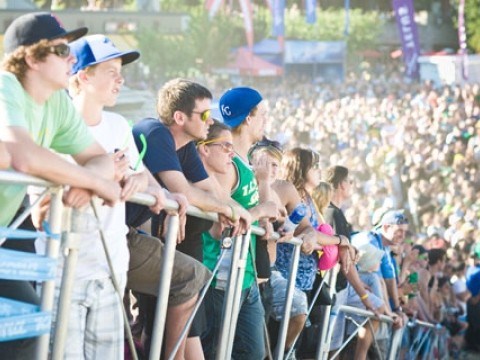Rumour had it the Olympics were going to boost Whistler up to Cloud Nine where it would coast easily over the remainder of the recession.
But that hasn't been the case, as shown by this winter's eight per cent drop in room night sales. While the numbers look grim, Whistler is the first municipality to host an Olympic Games in the midst of a recession, and without anything to compare it to, experts are unable to say whether or not the current struggles should be considered normal. What is clear and has been repeatedly stated by Tourism Whistler and the media is that the spin-off benefits from the extensive media coverage of Whistler during last year's Games would take 12 to 24 months to show.
"When it comes to developing new markets, today we're seeing visitation from people already on a Vancouver trip and visitation from regional markets in summertime again," said Tourism Whistler President and CEO Barrett Fisher.
"But when it comes to developing new awareness markets, if we're bringing skiers from overseas markets where they're travelling to Canada, the belief was that would take a longer period to develop."
Having near perfect occupancy last February and March (97 per cent) meant any numbers from this winter were likely to be disappointing. All indications from the original Tourism Whistler (TW) forecast pointed to lower numbers. The surprise was the slower-than-expected turnaround of the U.S. market.
"The piece that was new for us was the fact that when you look at what all the Bank of Canada indications were forecasting, what the Conference Board of Canada, and all of the major financial institutions that we rely on for our own forecasting information (said), there was a belief before last summer, early fall, that we would start to see some rebound from the U.S. market and so this is separate and distinct from the Games and more about our typical skier market and would they start to increase travel," said Fisher.
"In fact, some of the projections of both U.S. and U.K. travel were since downgraded, so we in turn downgraded our own forecast but the outcome as a result was lower than we originally anticipated just based on our information and that is primarily due to the currencies in both the U.S. and U.K., weaker currencies against a strong Canadian dollar certainly does undermine purchasing power and travel is often one of the first things to go."
Looking back, winter seasonal occupancy in the 1999/2000 season was about 70 per cent. The trend was downward from there until 2005/2006 when it began to climb again to reach over 60 per cent the following year. It took a dive again in 2008/2009 but has been climbing back and last season sat just below 60 per cent.
According to Big White and Silver Star ski resorts Senior Vice-President Mike Ballingall, when things go awry in Whistler's market, they're sure to do the same elsewhere in B.C. Much of that is due to the measures taken by Whistler hotels to attract visitors when times are tough. The last minute discounted room-nights and 72-hour specials marketed by the resort to maintain a competitive edge suck traffic away from smaller hills located further from Vancouver.
"Whistler was incredibly thirsty and the price points that Whistler puts into the marketplace hurt us significantly," he said. "We don't do well until Whistler fills up and when Whistler fills up, all the other resorts in B.C. do well and that is simply because it (Whistler) displaces regional traffic and with the new Sea to Sky Highway and the promotion they did in Washington State they would have stolen market share from us there, they would have stolen market share from Vancouver and the Lower Mainland."
Ballingall said Silver Star had a relatively good year, with overnight occupancy up seven per cent and skier visits up two per cent. He credits the sales to the World Master Cross Country ski competition held in March.
"It was literally those 10 days in March which tipped us over. Without that we would have been flat," he said.
"Comparing apples to apples it was as cheap, if not cheaper, to go to Whistler, it's closer so people were making the decision to maybe visit us once and Whistler twice or three times instead of a fifty-fifty split. That one extra visit for us is huge numbers."
Without an event to draw crowds, Big White didn't have as much luck as Silver Star in attracting tourists. It was down five per cent in room night sales and skier visits were flat.
Both Big White and Silver Star depend heavily on air access into Kelowna International Airport, and in a recession the extra fees to connect also give tourists an extra reason to go elsewhere.
"The problem is the add-on airfare, it just becomes cost prohibitive - for a family of four it became $1,200 more expensive to go to Big White than it cost to go to Whistler, all things being equal," said Ballingall. "We are the little brother to the big brother and when Whistler does well, we all do well. And so the demand is increasing for us, it's just about connecting. We're very mindful of the great job they do; it's just a matter of being able to get people to us as easy as they can get to Whistler."




